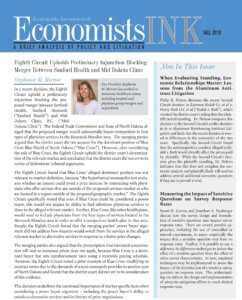Economists INK: Fall 2019

This issue discusses the Eighth Circuit’s consideration of power buyer arguments, economic lessons from the Second Circuit’s decision in Eastman Kodak Co. et al v. Henry Bath LLC et al (“Kodak v. Bath”), and measuring the impact of sensitive questions on survey response rates. Dr. Mirrow discusses the Eighth Circuit’s consideration of the merging parties’ power buyer arguments, including market specific facts, in its decision to uphold a preliminary injunction blocking the merger between Sanford Health and Mid Dakota Clinic. Dr. Nelson compares the Second Circuit’s recent ruling in Kodak v. Bath to its earlier decision in In re Aluminum Warehousing Antitrust Litigation and finds that the recent decision is rooted in differences in the economics of the two cases. Dr. Gurrea and Dr. Neuberger discuss how survey design and formulation of sensitive questions may impact survey response rates and how empirical techniques may be implemented to asses the impact of a sensitive question on response rates.
